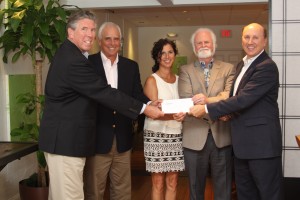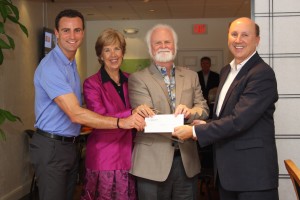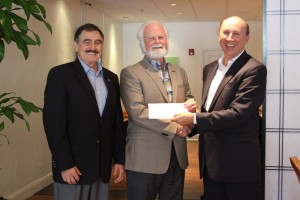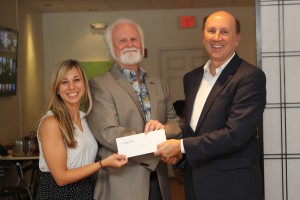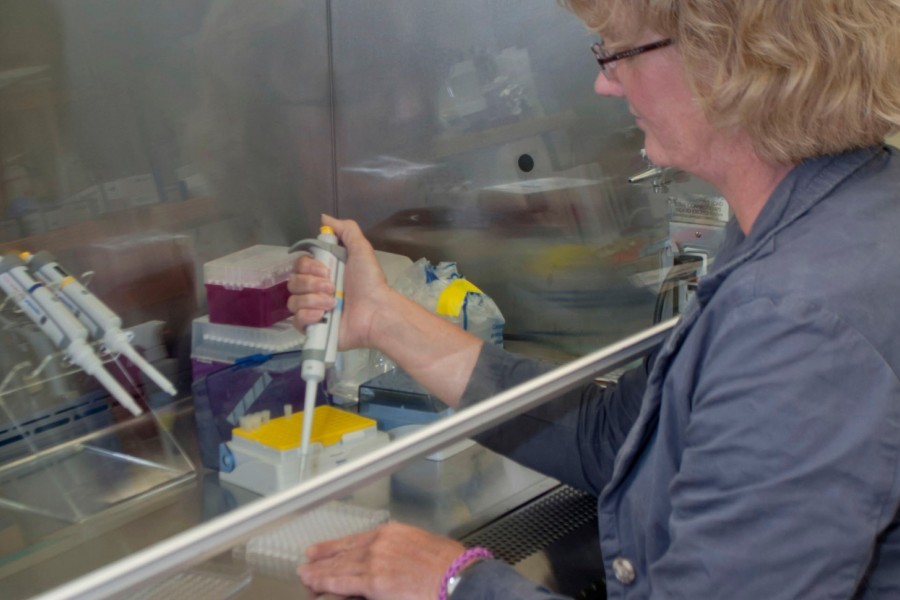Gulf Coast Innovation Challenge finalists receive $25,000 grants, begin next phase
Five finalist teams have received $25,000 each for game-changing research and development projects in the Gulf Coast Innovation Challenge — an initiative of the Gulf Coast Community Foundation that aims to advance marine science and Southwest Florida’s “Blue Economy.”
On Monday, Aug. 10, Gulf Coast leaders presented checks to Challenge participants from: Mote Marine Laboratory, University of South Florida, Omeza, LLC, and Healthy Earth, organizations that are each involved in at least one finalist project. Mote is leading or partnering in four of the five finalist projects.
This incentive-grant challenge — likened to the XPRIZE for its focus on problem-solving innovation — seeks new solutions for Blue Economy pillars like marine science, technology, biomedicine, sustainable aquaculture, healthy fisheries and much more.
The five finalist teams are now entering the prototype phase of the Challenge, which runs through Oct. 30, and they will present their prototype solutions to judges in early November. In mid-to-late November, Gulf Coast will announce the winning team and grant them up to $375,000 to develop the winning solution for market.
- The public can follow the finalists’ progress. Starting Aug. 24, teams will post video updates every other Monday at: www.gulfcoastchallenge.org.
“This Innovation Challenge is a new and different way for Gulf Coast to deploy our philanthropic dollars to support your work and invest in our region," Dr. Mark Pritchett, senior vice president of Gulf Coast Community Foundation, told the finalists. "Now we want to see your long-term thinking. Our Board is interested in projects that will go on beyond our Challenge and stand on their own legs, creating opportunities and new jobs in this community."
“This Challenge has already opened new doors for outstanding innovators in our region — and that will have a lasting impact on science, economics and quality of life,” said Dr. Michael P. Crosby, President and CEO of Mote. “For example, as Mote and its partners work to discover and develop antibiotics and cancer-fighting substances from the ocean, we envision a triple benefit: advancing the major economic drivers of biomedical research and development here in Southwest Florida; helping to enable better quality of life for people with serious diseases; and raising awareness of our oceans as treasure troves that must be studied further and used sustainably.”
Below are details about projects involving Mote, including updates for this new phase of the Innovation Challenge.
---
Antibiotics from the Sea
In “Antibiotics from the Sea,” Mote and commercial collaborator Omeza, LLC aim to advance research and investment into finding and developing ocean-derived antibiotics that hold promise for battling dangerous infections in humans.
Mote researchers have extensively studied marine microbes (microscopic life forms such as bacteria) that benefit ocean organisms such as corals and fishes. They’ve already found that some marine microbes involved in ocean animal health have the potential to help humans. Marine microbes have existed much longer than humans or other animal life, giving the microbes more time to evolve amazing abilities that scientists are uncovering now.
For example, Mote’s Coral Reef Ecology & Microbiology Research Program has found that some ocean-derived microbes produce antibiotic substances that show promise for fighting dangerous pathogens like MRSA (or methicillin-resistant Staphylococcus aureus), strains of Enterococcus species and other infectious bacteria that have developed resistance to existing antibiotic treatments. These pathogens can cause major problems in hospitals. Also, some ocean-derived bacteria seem to produce broad-spectrum antibiotic substances.
Combining the scientific strength of Mote and the business acumen of Omeza could bring forth new therapeutic agents to counter serious human pathogens.
In the prototype phase of the Innovation Challenge, key steps for this project may include: creating and packaging a prototype product using antibiotic extracts derived from marine microbes, examining ways to market Mote’s “library” of ocean-derived bacteria strains — including yet-to-be-studied bacteria that could offer benefits beyond antibiotics — to the scientific community, honing a business plan and clarifying the unique selling proposition that will help antibiotic substances discovered in the lab advance to commercial use.
Cancer Therapies from Sharks
“Cancer Therapies from Sharks” — a partnership effort among Mote, University of Central Florida and commercial collaborators Sun BioPharma and Northern Capital Partners — aims to build upon Mote’s unique research with cancer-fighting substances from shark immune systems. The project seeks to bring Mote’s innovative basic research to new levels with the ultimate goal of finding and developing improved treatments for cancer patients.
Sharks and their relatives have a low incidence of disease, including cancer. Scientists in Mote’s Marine Biomedical Research Program and Marine Immunology Program have found that certain substances from shark immune systems have cancer-fighting properties that inhibit 15 human tumor cell lines in the lab. Mote scientists have learned a great deal about how these substances attack cancer cells — including that the substances attack cancer cells preferentially to non-cancerous cells. That is a promising discovery in the long-term quest for new cancer therapies.
Mote and UCF scientists hope to isolate active agent(s) from Mote’s shark-derived, cancer-fighting substance, and work with Sun BioPharma and Northern Capital experts in pharmaceutical development and finance to move the research results toward drug development, with support from the Gulf Coast Innovation Challenge and leveraged private investment. The project aims to advance a Florida-based biotech enterprise to develop and commercialize marine science and technology.
In fall 2015, cancer-fighting substances that Mote scientists extract from sharks will be tested by UCF scientists to determine whether the substance remains potent after shipping on dry ice, thawing and re-dissolving in liquid. UCF and Mote scientists will conduct simultaneous tests to examine the substance's effects on cancer cells in the lab, to ensure the methods and results are consistent between different scientific teams — an important step in any scientific study aimed at developing potential therapies for use in human diseases such as cancer.
Using these experiments as a guide, UCF will begin examining which specific component(s) of the substance might account for its cancer-fighting properties. They will use a column designed to separate molecules, concentrate the separated substances and test them again with cancer cells to see how well each component of the original mix might account for its cancer-killing properties.
Meanwhile, Mote scientists will begin working toward another key goal: seeking a way to continuously grow the bonnethead shark immune-system cells that produce the cancer fighting substance. This is a step toward ensuring that more of the cancer-fighting substance can be produced without the need to catch more sharks.
Advanced Solar-powered Filtration Technology for Marine and Freshwater
Mote Marine Laboratory, the University of Washington’s Pollack Laboratory, and ROBRADY design propose to turn basic research into a working water-purification device that could transform marine and freshwater filtration models.
This project aims to develop, market and manufacture a new technology that produces a renewable source of clean, fresh water from recycled wastewater and desalination of brackish and salt water. This goal is critical: water sources such as aquifers are becoming depleted and billions of gallons of wastewater are being produced continuously.
Dr. Gerald Pollack and his team at University of Washington have invented and patented an exciting solar-powered, water-filtration system. The system uses the natural behavior of water molecules against specific surfaces to separate out harmful substances without needing to pass the water through a porous filter. It uses sunlight energy to power the movement and filtration of water.
The patented technology invented by Pollack’s lab will be tested by Mote scientists, whose expertise in water quality and ecotoxicology will be ideal for verifying the system’s efficiency in removing contaminants and even pathogens from water. ROBRADY design, a Sarasota-based, internationally recognized design, engineering and marketing firm, will lend its expertise in prototyping new technology and developing marketing and business plans to progress from research to application.
During the prototype phase of the Innovation Challenge, Mote scientists will begin their scientific testing of the prototype filtration system for different types of water purification. The Pollack lab has tested it successfully for certain applications, and Mote scientists seek to expand that testing. They will also test whether recent redesign efforts have improved the system’s efficiency.
Healthy Earth - Gulf Coast: Sustainable Seafood System
A team led by sustainable-food company Healthy Earth proposes to develop a sustainable seafood system with value-added seafood production built on the region’s striped-mullet fishery. For more information on this multi-partner project, visit: www.gulfcoastchallenge.org
Mote's role: Sustainable mullet fishery stakeholder workshop
During the Innovation Challenge’s prototype phase, Mote — an independent, nonprofit marine science institution — will host and facilitate a roundtable discussion forum that brings together key stakeholder groups to discuss science, perspectives, ecology, economics, cultural values and local knowledge regarding the grey striped mullet fishery in Sarasota Bay and surrounding waters.
Stakeholder groups will include commercial and recreational fishers, marine scientists, resource managers, local and regional community leaders, conservation groups and others interested in and focused on Southwest Florida’s grey striped mullet fishery. Participants can share knowledge, ask questions and discuss how a fisheries improvement plan might be developed to maximize sustainable use of the mullet fishery — increasing its benefits to multiple stakeholder groups, nurturing southwest Florida’s Blue Economy and ensuring this valuable natural resource remains a vital part of the local culture and healthy environment for generations to come.
Date and details will be announced on Mote’s web site and social media. Please stay tuned.
---
Founded in 1955, Mote Marine Laboratory & Aquarium is celebrating its 60th year as an independent, nonprofit 501(c)3 research organization. Mote’s beginnings date back six decades to the passion of a single researcher, Dr. Eugenie Clark, her partnership with the community and philanthropic support, first of the Vanderbilt family and later of the William R. Mote family.
Today, Mote is based in Sarasota, Fla. with field stations in eastern Sarasota County and the Florida Keys and Mote scientists conduct research on the oceans surrounding all seven of the Earth’s continents.
Mote’s 25 research programs are dedicated to today’s research for tomorrow’s oceans, with an emphasis on world-class research relevant to the conservation and sustainability of our marine resources. Mote’s vision also includes positively impacting public policy through science-based outreach and education. Showcasing this research is Mote Aquarium, open from 10 a.m. to 5 p.m. 365 days a year. Learn more at mote.org.
Contact Us:
Mote Marine Laboratory and Aquarium, 1600 Ken Thompson Parkway, Sarasota, Fla., 34236. 941.388.4441
Copyright©2015 Mote Marine Laboratory and Aquarium, All rights reserved.
unsubscribe from this list update subscription preferences
About Gulf Coast Community Foundation
Together with its donors, Gulf Coast Community Foundation transforms our region through bold and proactive philanthropy. Gulf Coast is a public charity that was created in 1995 through the sale of the Venice Hospital. Since then, it has become the philanthropic home of more than 600 families who have established charitable funds there, and they have invested over $200 million in grants in the areas of health and human services, civic and economic development, education, arts and culture, and the environment. Learn more at GulfCoastCF.org.
